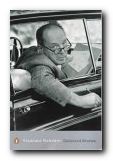a critical examination of Nabokov’s collected stories
 Nabokov believed that literature should not be made to serve as political propaganda, since in doing so it would become aesthetically damaged. He seems to forget that his own works which speak against tyranny and in favour of liberal humanism (Invitation to a Beheading, ‘Tyrants Destroyed’) are propaganda of a kind – but his belief is justified in the eyes of those who believe that these are amongst his weakest works.
Nabokov believed that literature should not be made to serve as political propaganda, since in doing so it would become aesthetically damaged. He seems to forget that his own works which speak against tyranny and in favour of liberal humanism (Invitation to a Beheading, ‘Tyrants Destroyed’) are propaganda of a kind – but his belief is justified in the eyes of those who believe that these are amongst his weakest works.
Certainly his last story of this type, ‘Conversation Piece’ (April 1945) falls into this category, since the purpose at its centre is to send out a political warning. It is interesting to note apropos the question of aesthetics being damaged by overt didactics (strong opinions!) that the story features two elements which rate highly amongst Nabokov’s own prejudices – Germans, and women.
The story begins with what looks like a return to the double theme. The narrator informs us that he has an exact namesake – ‘complete from nickname to surname’ (ND,p.125) – with whom he has sometimes been confused. But this strategy is used only as a plot device to get the narrator to a gathering in Boston to which he has been invited by mistake.
There, a group of gullible and elderly American women are being addressed by a German professor, Dr Shoe. In his speech he seeks to reconcile America and Germany immediately after the end of the war by pouring suspicion onto Britain, claiming that Nazi atrocities are just allied propaganda lies, that German soldiers were clean, decent, and honourable, and that people should not be misled by ‘the vivid Semitic imagination which controls the American press’ (p.136).
The narrator complains to the hostess about Dr Shoe and leaves in disgust, but then a week later he receives a letter from his namesake reproaching him for his bad behaviour at the meeting and ending with a demand for money.
The problems here are that the story is little more than a synopsis of Dr Shoe’s reactionary propaganda. None of the characters are developed, and there is almost no connection between the double device and what happens at the meeting – except to underscore the reactionary company the narrator’s double keeps, which we already know at the beginning of the story.
It is difficult to find a sympathetically portrayed German in the whole of Nabokov’s fiction, and as Andrew Field points out in confronting this phenomenon ‘Were it not for the events of this century, Nabokov’s attitude towards things German might be regarded as whimsically as Dr Johnson’s attitude towards Scotsmen’ (LA,p.206).
But the same might also be said about women – using Dr Johnson as a parallel in this case too. Some of his female characters are idealised love objects, but more often they are adulteresses (Martha in King Queen Knave) tormentors-of-men (Margot in Laughter in the Dark) or dim-witted vulgarians (Lydia in Despair). The problem for the humanist reader is that Nabokov covers his prejudices with very witty presentation:
‘None of the women were pretty; all had reached or over-reached forty-five…All looked cheerfully sterile. Possibly some of them had had children, but how they had produced them was a forgotten mystery; many had found substitutes for creative power in various aesthetic pursuits, such as, for instance, the beautifying of committee rooms’ (p.131)
It is fortunate for admirers of Nabokov’s work that such overt misogyny is rare – and that such wit is ubiquitous.
© Roy Johnson 2005
![]() Vladimir Nabokov: The Collected Stories – Amazon UK
Vladimir Nabokov: The Collected Stories – Amazon UK
![]() Vladimir Nabokov: The Collected Stories – Amazon US
Vladimir Nabokov: The Collected Stories – Amazon US
Vladimir Nabokov web links
Vladimir Nabokov greatest works
Vladimir Nabokov criticism
Vladimir Nabokov life and works
Woefully lacking. You equate Nabokov with his narrator? Mere assumption. You offer no explanation for the final paragraph, neither of the elusive definition of the obvious doppelganger. If the cap fits wear it! Your synopsis betrays that Vlad. has gone over the top of your head once again. You sound like one of the ladies who admired Shoe’s eloquence.
Thank you for your response David.
I have taken the liberty of editing your message into complete sentences, to which my responses are as follows
1. I see no evidence in the text for a distinction to be made between Nabokov and his narrator. They share the same values.
2. The final paragraphmerely summarises my observations on Nabokov’s prejudices against Germans and many of the women in his work.
3. The story does not seem to me to offer any further information with which we can ‘identify’ the double. If you can produce any, I would be interested to see it.
4. If you think Nabokov has gone ‘over my head’, I would also be interested to read an alternative interpretation of the story.